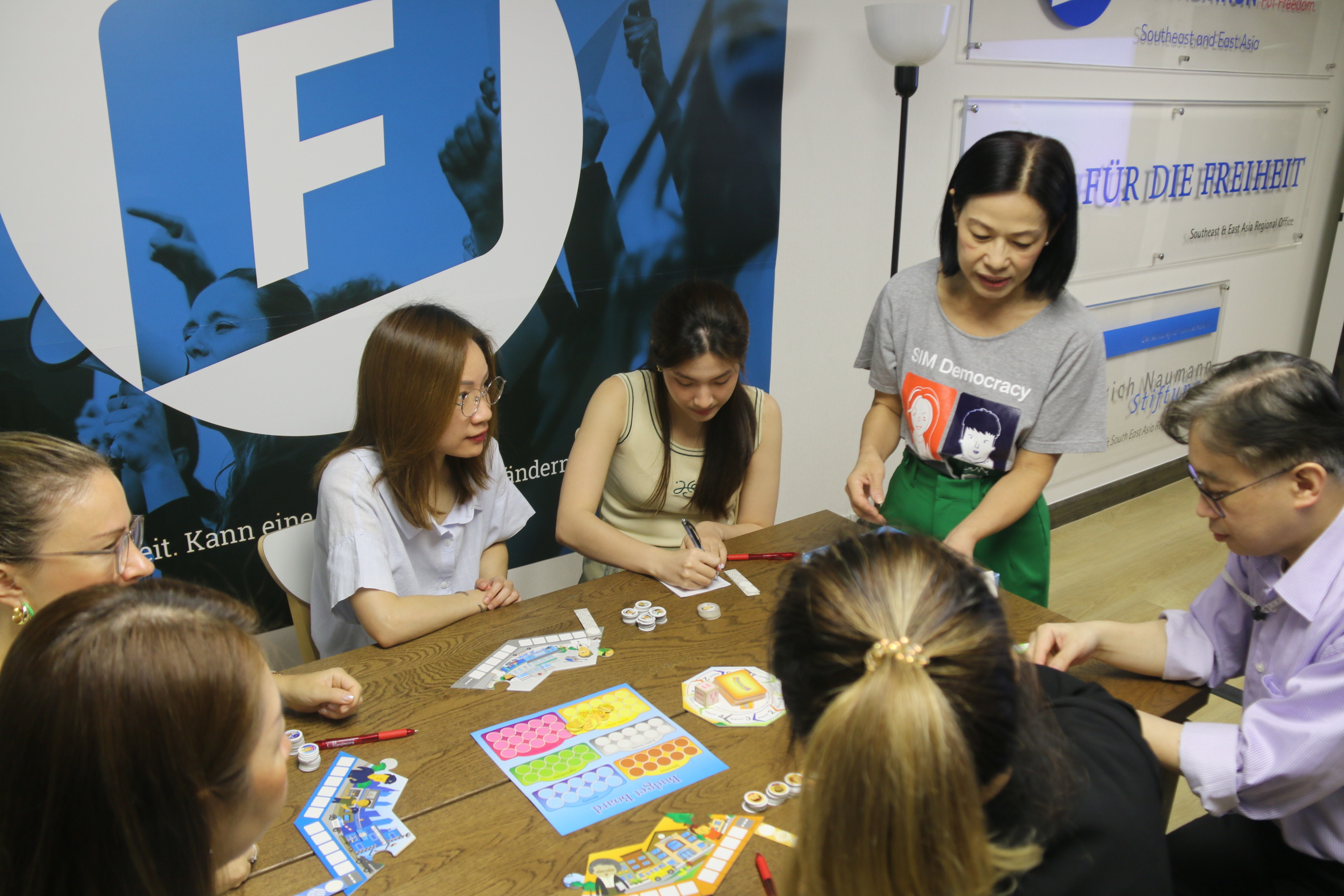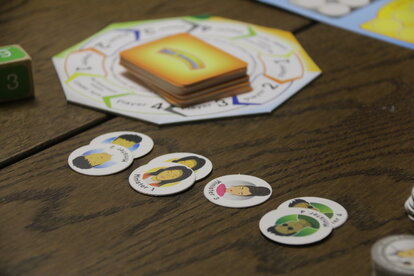Thailand
Revisiting How Board Games Can Revolutionize Civic Education

Dr. Pimrapaat Dusadeeisariyakul, FNF Thailand Programme Manager, teaches the game to our latest member of Staff in the Bangkok Office
© FNF ThailandIn an era dominated by digital distractions and fleeting attention spans, an unlikely hero is emerging in the realm of education – board games. Here at FNF, we firmly believe that board games possess the potential to enhance civic education, providing a distinctive and captivating platform to navigate the complexities of democracy and civic participation.
A standout example is "SIM Democracy," a roleplaying board game designed by FNF aimed at high-school students, first-time voters, and young adults. This innovative creation secured its place as one of the pioneering democracy innovation ideas at the 2014 World Forum of Democracy. With its immersive gameplay, participants assume the roles of citizens, politicians, and policymakers, navigating the twists and turns of decision-making, resource allocation, compromise, and civic responsibilities. The aim is to give players a deeper understanding of the democratic process and the significance of civic participation.
SIM Democracy provides education for first time voters. Most students learn about democracy in a classroom. Players of SIM Democracy can learn about democracy, election, political party and party programme formulation

The SIM Democracy board game also earned a prestigious spot in ‘The Best Practices Manual on Democracy Education’ by The United Nations Democracy Fund and gained recognition in the 2014 Final Report titled 'From Participation to Influence: Can youth revitalize democracy?‘ by the World Forum of Democracy.
Navigating the Game:
In SIM Democracy, the game allows the participants to play different roles within a democratic society, as either the government or an ordinary citizen. . Each player is entrusted with proposing policies and conducting policy-centric campaigns, culminating in a collective vote to determine the most favourable approaches. Those elected to government leadership roles shoulder responsibilities such as budget planning, resource allocation, and overseeing infrastructure, ensuring support across four critical policy domains – public health, security, public education, and environmental protection. Meanwhile, citizens within the game are tasked with income generation, tax payment, community initiatives, charitable endeavours, and the essential role of monitoring the government's actions. This dynamic gameplay not only simulates the intricacies of democratic governance but also emphasizes the multifaceted responsibilities and interactions that define an engaged civic society.

SIM Democracy Boardgame
© FNF ThailandEducational Benefits:
The advantages of using board games for civic education extend beyond knowledge acquisition. These games foster critical thinking, strategic planning, and collaboration. SIM Democracy, allows players to express their opinions on contemporary issues in a safe environment, breaking down the barriers of intimidation associated with political discussions.
The integration of board games into formal education settings has proven to be a success story. In 2015, the Election Commission of Thailand took a proactive step by distributing 500 SIM Democracy in a school catering to ethnic minorities in Chiang Mai, subsequently extending its reach to schools nationwide. The positive feedback from participating students underscores the effectiveness of this innovative approach, demonstrating the game's potential to engage and educate diverse student populations across the country.
The remarkable success of SIM Democracy has propelled its reach across linguistic boundaries, with translations available in English, Korean, Burmese, French, and Bahasa. This international acclaim has been further solidified through training sessions conducted globally, spanning diverse locations such as Korea, Myanmar, India, South Africa, Bhutan, Zimbabwe, and Germany. Anticipating the upcoming elections in Sri Lanka, the game has been dispatched to our FNF Office in Sri Lanka with the specific aim of enhancing civic education and fostering increased participation among the younger demographic.
In conclusion, as educators and policymakers seek innovative methods to enhance civic education, board games stand out as a powerful tool for fostering active and informed citizenship. The marriage of entertainment and education within the confines of a board game provides a dynamic platform where players can explore the complexities of democracy, learn from their experiences, and emerge as empowered, civic-minded individuals. It is time to recognize the pivotal role that board games can play in shaping the civic leaders of tomorrow – one roll of the dice at a time.
*Sky Warisala Chatuchinda is the Regional Communication Officer for the Friedrich Naumann Foundation for Freedom*

FNF Thailand Team presenting the SIM Democracy Boardgame
© FNF ThailandSIM Democracy on the WISE Channel
Thailand: Board Game 'SIM Democracy' to Teach Good Governance (Learning World: S5E02, 2/3)
© WISE Channel